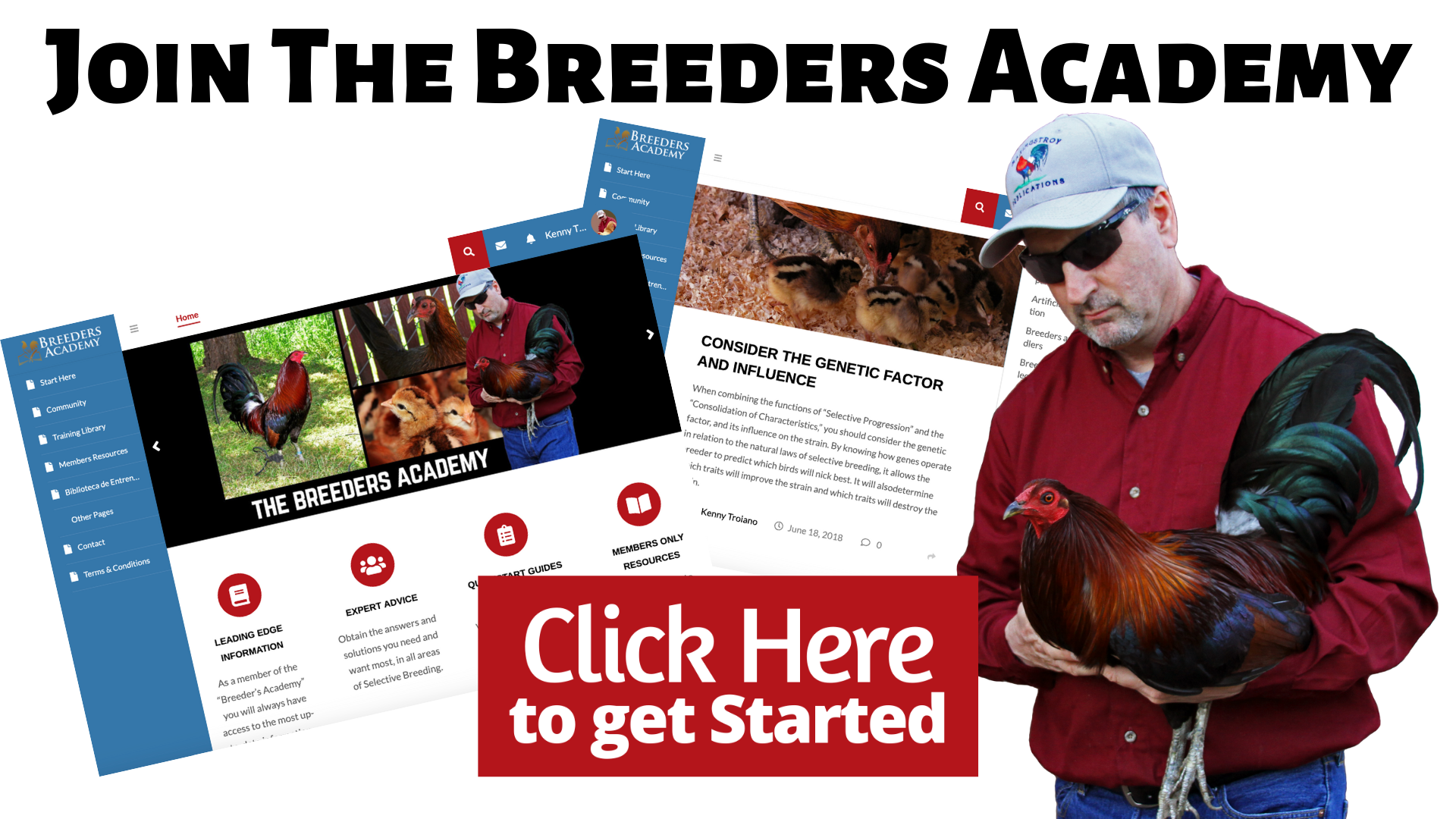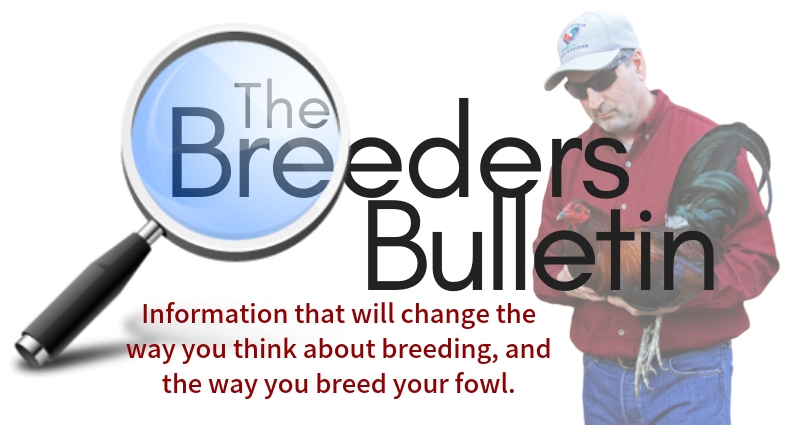What Evolution Did for Me and My Breeding?
(Show Notes)
Welcome to the Bred to Perfectionpodcast, a show for the serious breeder. Join Kenny Troiano, and his wife, Nancy, as they talk about the breeding of gamefowl and chickens, and the issues that affect breeders like you.
Whether you are breeding and raising Hatch, Sweaters, or Kelsos, or you prefer Reds over Greys, we can help you to advance your strain to the next level.
Breeding gamefowl and improving our brood fowl has become both an artform and a science, and knowing genetics and the law of inheritance has change, not only the way we think about breeding, but how we breed our fowl. It is our hope that the Bred to Perfectionpodcast will motivate you to take the next step in creating the fowl of your dreams.
To learn more, go to: www.breedersacademy.com
Today’s show notes:
This was a show we did in honor of Charles Darwin. In fact, the day we recorded this episode (2-12-19), it was Charles Darwin’s birthday, officially known as Charles Darwin Day.
We were in our truck, on our way to Disneyland, and thought it would be a good idea to record a Bred to Perfection episode on the way there. We have not don’t one on the road at this time and wanted to see how well this worked out.
We are always looking to get more done on the membership site (The Breeders Academy) and the podcast (Bred to Perfection), whether its writing an article or program or editing a show. But the question we were asking ourselves was, can we record an informative and entertaining show while driving?
We will let you decide. Let us know what you think, and should we continue to do more on the road or stick with our in-studio productions?
We will talk about how Charles Darwin discovered Natural Selection, and how he contributed to Artificial Selection.
We also talk about how Darwin helped me to gain a greater understanding of evolutionand how it relates to the breeding of my fowl. How by following Mother Nature and I could improve the quality and performance of my fowl.
We will talk about the fact that Charles Darwin (1809-1882) was born the same exact day as Abraham Lincoln (Feb 12th1809).We will also talk about the significance of his visit to the Galapagos islands and how it influenced his thinking and discover of natural selection.
We also talk about a naturalist, known as Alfred Russel Wallace, who almost beat Darwin to the post and came up with the same outcomes as Darwin, and how they resolved this issue.
We will also talk about other prominent scientistswho contributed to his discover of evolution and natural selection.
This includes Jean Baptiste Lamarck(1744-1829), also known as the Lamarckian Evolution.
- Lamarck was responsible for the inheritance of acquired characteristics.
- Lamarck used the giraffe as a simple/example of his theory.
Robert Bakewell(British) 1725-1795 – is known as the father of selective breeding.
- He was a sheep and livestock breeder who had a huge influence of breeders of the time,
- and we still use his methods to this day.
Gregor Mendel(1822-1884), known as the father of Genetics and Heredity of Traits.
- Law of segregation of genes (1stlaw) miosis/crossover – 2 alleles for each trait – dominant or recessive
- Law of independent assortment (2ndlaw) traits separate independently and do not affect other traits.
- Law of dominance (3rdlaw) homozygous dominant /homozygous recessive
Reginald Punnett:
- The importance of the Punnett’s Square
- Measuring and determining:
- Monohybrid crosses – one trait/two alleles
- Dihybrid crosses – two traits/ multiple alleles
- Measuring and determining:
Thomas Hunt Morgan(1866-1945)
- He discovered
- chromosomes,
- and how genes are carried on Chromosomes
- Sex chromosomes
- Sex linked traits
- Crossing over
- Linkage – genes that are closely linked and pass together
Hugo De Vries– who grew plants (the evening primrose) and discovered mutations, and gave us a greater understanding of how they can influence a species and change breeds.
We will talk about how the difference of natural selection vs artificial selection, and why it’s beneficial to know about both.
We will talk about the elements that make up natural selection, and you too can use them to improve the quality and performance of your strains. Such as:
Why Breeders should emulate mother nature closely.
Importance of Variation
- Important in both natural selection and artificial selection.
- Without variation, selection in impossible, and without selection, improvement is impossible. In other words, variation makes selection possible, and selection makes improvement possible.
- No variation – no improvement.
- The Selection of phenotypic traits to improve the strain.
- Improvements are made through small but subtle variations.
Adaptation and Survival of the fittestand how we should emulate Mother Nature through culling, and the benefit of free-ranging.
Over production of offspring, which translates to breeders as more offspring are produced that will survive, and through selection and culling we can improve our strains.
Sexual selection, and the importance of the hen.
Genetic variation and genetic drift
- Understanding the founder effects (tight genepool /lacking traits)
- Understanding the bottleneck effect (less population/loss of genetic variation)
- Achieving Uniformity
Geographic isolationand why it’s best to keep a closed yard.
Quantitative Traits – also known as polygenic inheritance (poly means many)
- How quantitative traits function
- Importance of knowing which traits are measurable
- Variations within the family
- Evidence of traits that vary in intensity (Bell shape curve)
Making sure that the offspring are always be better than the parents.
- The consequences of selecting offspring that lack or are not better than the parents.
We hope you enjoyed the show, and that we give you information that will help you to improve the quality and performance of your fowl.
The questions I have for you are:
- How is the conformation of body of your fowl?
- How is the performance and production ability of your fowl?
- Are your fowl good representatives of their breed and variety?
- Are your fowl Pure, or are they hybrid crosses?
- Do your fowl meet the Standard of Perfection requirements?
- How far are you willing to go to learn what it takes to breed higher quality fowl, with superior performance ability?
Join the Breeders Academy today, and learn what it takes to become a Master Breeder. We have two classes, an Apprenticeship class and Master class. Check it out! Just go to:
https://americangamefowlbreedersacademy.com
Thanks for joining us.
Take care and good luck.
Kenny and Nancy Troiano
Founder of the Breeders Academy
Author of the “Gamefowl Breeders Manuals”
Writer for “The Poultry Press” and “The Gamecock Magazines”

